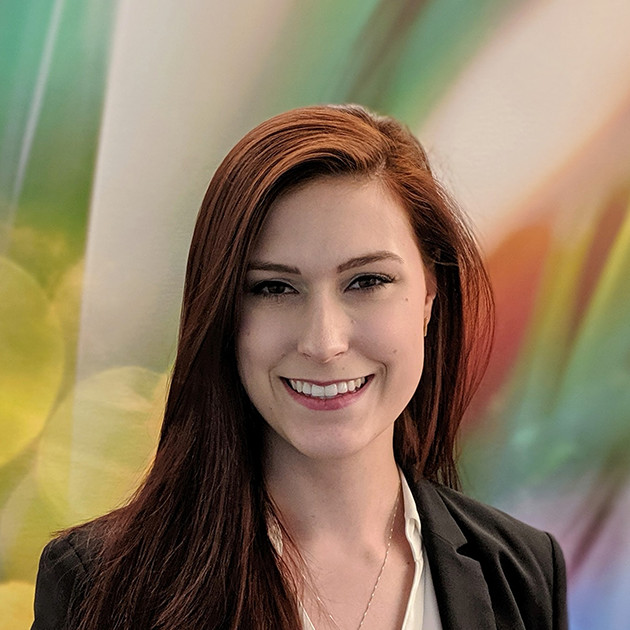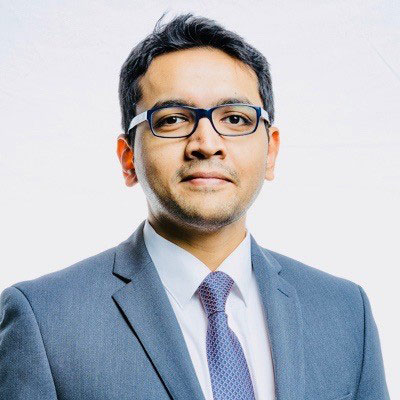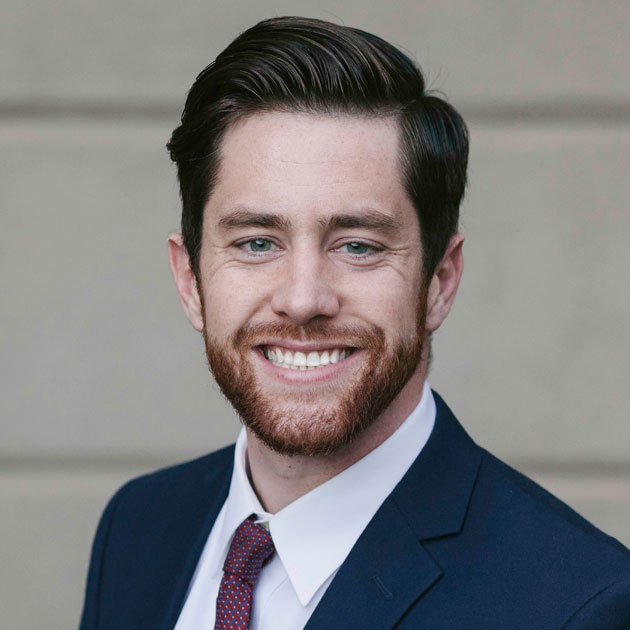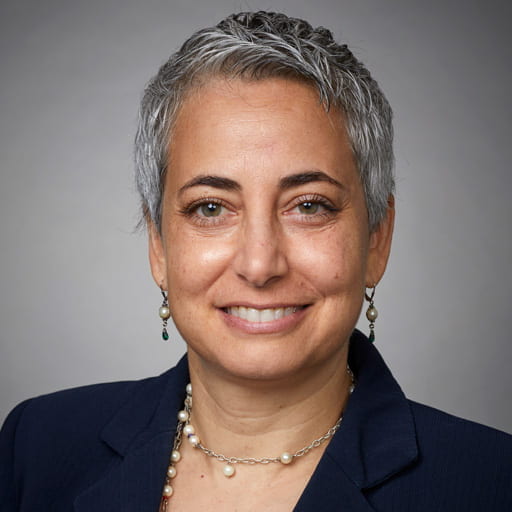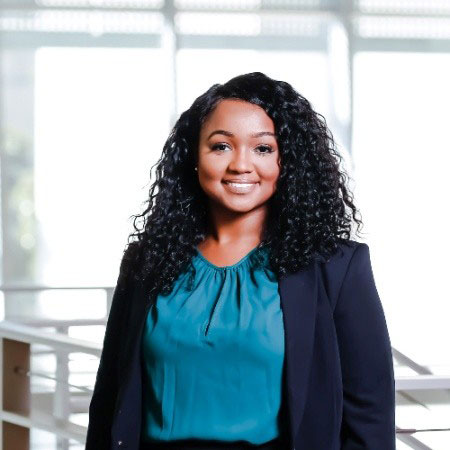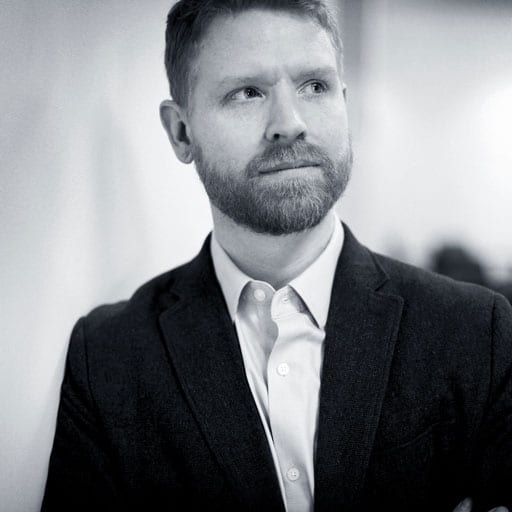
Elijah Metcalf, MBA’11, joins host Dr. Monica Powell for a discussion about nontraditional paths to an MBA and a business career. Metcalf, a vice president of internal audit at NexBank, discusses why a theater background such as his did not put pursuit of an MBA out of the realm of possibility. He explains that he parlayed his communications skills and creativity into a role as a contributing member of his fulltime MBA cohort and then used those skills again in his rise up the corporate ladder.
Transcript
Introductory music plays up through Monica’s introduction.
[Monica] Well, Hello there, I am Monica Powell, I am the Senior Associate Dean and Graduate Dean here at the Jindal School of Management at the University of Texas at Dallas. Well, today, we are so honored to have one of my favorite MBA alums here…
[Jimmie] This is yet another MBA G.O.A.T. A podcast featuring conversations with the greatest of all-time MBA alumni from the Naveen Jindal School of Management at the University of Texas at Dallas. We are here to celebrate the outcomes of graduate management education and to identify remarkable examples of how the MBA program here at the Jindal School has transformed the lives of our alumni. Now, here’s Dr. Monica Powell, senior associate dean and graduate dean at the Jindal School. Take it away, Monica.
[Elijah] Oh, wow!
[Monica] …on the podcast. So, I would like to welcome Elijah Metcalf.
[Elijah] Hey.
[Monica] How do you feel about being an MBA G.O.A.T.?
[Elijah] I am very, I am very honored and very excited to be talking to you and really excited to be able to speak about my experience.
[Monica] You know, you had a very remarkable journey as an MBA student and, you were remarkable in terms of your background. I mean, if I remember correctly, you were a theater major.
[Elijah] That’s correct, yes. So, my undergrad was in theater, a four-year Bachelor of Arts degree. Didn’t take a single business class, didn’t take accounting, I did take math and science, but nothing that would, nothing that at all prepared me for the MBA here.
[Monica] So, do we want to admit to the MBA G.O.A.T. podcast listeners that you went from theater to audit?
[Elijah] Absolutely. Well, I think that is a tremendous journey you can take here at UTD. That you know coming into this, I did not know what internal audit was. I had never heard the term before. Someone said audit, I thought that was taxes. However, coming here, learned what internal audit was now, I’ve put together a 10-year career so far and hopefully at least 20 or 30 more years after this.
[Monica] So, when you think back, Elijah, to your time in the program…
[Elijah] Yes?
[Monica] …and it to me it seems like absolutely yesterday
[Elijah] Sure.
[Monica] But it wasn’t.
[Elijah] No, it was ten years ago almost (laughing).
[Monica] So, when you think back to that time, what stands out as kind of those transformative moments that took a theater major through accounting and core finance and marketing to find their way? How did you find your way into audit?
[Elijah] On the forefront, it was meeting with a counselor. So, I was pretty proactive in knowing that I knew I wanted to work in business. I had some experience working in sales and so, I knew sales wasn’t for me, but I wanted to find what is it within business that I want to do. And so, meeting with a counselor in that first week I was here got some great advice of, “Look into internal audit. We have the best internal audit graduate program in the world, so you might want to take a look at it.” So I took the advice, I went to the student chapter of the Institute of Internal Auditors and realized, “This is something I can do.
I like business process. I like finding solutions to problems. I like getting folks to collaborate and one thought at the forefront was I probably won’t be the most technically amazing auditor, I may not know all the accounting tricks, but I can use my strength in communication with the skills in auditing. I can learn here at UTD and that’s how I can put this career together.”
[Monica] So, you not only went out to become an auditor, a very successful auditor ten years out, but if I remember correctly, you have gone from senior internal auditor to internal audit manager to assistant vice president for internal audit. That is an amazing journey since you graduated from the program.
[Elijah] Yes, and not to interrupt and to my harm, but actually 6 months ago, I became vice president of internal audit. So, I think my resume I gave you didn’t include that, so I’m sorry. (laughing)
[Monica] Well, congratulations on that promotion!
[Elijah] Well, thank you.
[Monica] That is really an incredible transformation and you know, we talk to all kinds of prospective students that come from classical education backgrounds in English and in Philosophy, Sociology. We don’t often talk to a lot of theater majors.
[Elijah] Sure.
[Monica] But, that experience is relevant for somebody that comes in, so you were able to come in and learn the language of business, which is accounting and attack all of those other courses, even though you felt like you were adequately equipped maybe on the quantitative side. Can you talk to prospective students about how you can still be successful even if you haven’t been exposed?
[Elijah] Absolutely. And, I think it starts with the desire. I think if you know that you want to better yourself through education and you know that you are willing to do the work, you want to put in the time. And for me, it was focus more than anything that I really didn’t know. I didn’t know if wanted to be a teacher. I don’t. I would be terrible as a teacher (laughing). So, I do not have that great of patience. So, but to me, I had all of this energy, you know I am a fairly energetic person, but I didn’t know where to put it career-wise. I knew in my personal life, but I didn’t know in my career and that’s where with UTD, I thought the program did an excellent job with all of us. So, I was in the MBA Cohort, there was about 50 of us. I felt like everyone in that program knew where they wanted to go, even if they didn’t coming in. Now some people knew they wanted to do marketing, knew they wanted to do supply chain. Other folks were like me and just knew I need to figure this out and I need to get the education to move me in the career, but I felt there is such a great funnel that puts you in based on: What are your strengths? What are your interests? What are you going to be passionate about? What kind of lifestyle do you want? So that’s what I felt like the program did amazing at that. And so to me, a lot of not having those quantitative skills, it was leveraging my classmates, who did. And being in study groups and getting it and saying, “Hey look, I’ll do the presentation. I’ll get up in front of a thousand people and speak all day long even though I don’t know what I’m talking about, I’ll do it. But you, can you help me if I help you?” It’s sort of the trading of skills, you know the, the commerce of the or the currency of the department. What value? What strength do you have? Can you share that? Can we gain from that?
[Monica] You know, I think a lot of prospective students fear that if they don’t come in with an asset, they are going to be lost, but what you’re describing is this great environment of collaboration that everybody can make a contribution even if they don’t have an undergraduate degree in business.
[Elijah] Absolutely, I think that’s a great way everyone has an asset, whether they realize it or not. Because I came in not necessarily knowing what my asset was and then, realizing, “Oh, okay, I can get up and speak in front of people,” or “ Oh, I may be a little whimsical and have a little imagination and so when we are trying to come up with how to present something maybe my ideas are going to be this. You know I’m not necessarily the best “just production get it done”. That’s going to be somebody else. But, trying to find those I mean there’s all those personality tests and I always find them really enjoyable, cause I always think, “Oh, yeah, yeah, yeah that’s me.” But, I think knowing that you do have this value if you have the desire, if you have the habits and you are willing to put that in, you will find yourself in this program. You will have a lot of people who will really support you and who are going to help get you there.
[Monica] It’s really funny to me that you use the word whimsical…
[Elijah] Ha (chuckling)
[Monica] …and creative. You don’t typically describe a prospective MBA student as whimsical. So, I’m really curious there has got to be people who you knew as an undergrad or faculty that you have since met or your high school English teacher who might say, “Elijah, you became an internal auditor?” (Laughter) So can you, can you tell us what that reaction has been?
[Elijah] Sure, you know it, it’s funny because I even noticed it when I was a part of the program you know in the summer, you know I was taking a class and then, I decided you that I was going to work in internal audit. And so you know we have a great program for getting internships, paid internships at that, and so that was one thing when I was doing the interviews for that, people were saying like, “Help me understand. You were, you were a theater undergrad, you worked for the David Letterman show, you did plays and sound for plays. Now you’re in audit. What is this?” And, I kind of had to come up with kind of an elevator pitch. I had to come up with how can I put this into a minute because the story is a lot longer? So, how can I condense it? But, to me it was kind of this… I always kind of put it through sales to say well, you know, in theater, I needed a job, I need to make some money. Sales was an easy avenue because I can talk to people, I am comfortable with people. Then it turned into well in sales a lot of the techniques is trying to solve a problem. So, solve a problem. What does internal audit do? It takes problems and solves them. It’s just a different way of going about it, so um, but I’d say that folks that knew me, I mean I do have friends from undergrad who are very successful. Some are in movies. Some of them are on Broadway. Some of them play in bands and I keep, I keep in contact. They are some of my closest friends. And it is funny, they get it because of how passionately I talk about my work. So I talk about, “You know we had this audit. It was tough, but guess what, I got the, you know the SVP of this area to agree to do this, and he didn’t see but then when I explained it this way, he did and it had this cost saving.” And they are like, if you can get that excited about that, then you are absolutely in the right career because they are like, “that means nothing to me.” But you know it’s all about what gets you excited.
[Monica] Well, you have definitely made the case that somebody that comes from a nontraditional background can be successful getting an MBA.
[Elijah] For sure.
[Monica] You have absolutely made that case.
[Elijah] Good. (laughing)
[Monica] I would also like to congratulate you that you have made the case that accounting individuals and audit individuals are actually a lot of fun.
[Elijah] They can be. Oh, they absolutely can be and that’s where you know, when I was working for a General Motors’ Subsidiary, GM Financial based in Ft. Worth, we always said you know we are the fun audit. That was our kind and, you know there was about 40 people in our department. That was the whole thing was that we are like, look, nobody wants to see Internal Audit. No one gets excited, but if we make a human connection and you know, “maybe I don’t want him, but Eli’s not going to be a pain. Eli’s not going to make me miserable, he’s not the police. He’s not the cop. He does want to help me and if I can just deal with his nature, (small laugh) I can get over that he is going to be in my business for a little while. He actually will give me something of value.” And, that’s when I had staff members I tried to talk them about that, of like if there is any stereotype of what they are thinking, it’s literally going to be the opposite. If it’s that you’re going to be stodgy, be different, make a joke. If it’s going to be that you’re closed and cut off, be friendly. Give them a card. Do something to kind of break it down. I even had fun leveraging some of my more presenting skills to say, “Hey, what do we do about maybe doing a before the audit kind of overview of, “What Happens During an Audit?” And we work with our marketing department, you know we said we’re not the cops, put a little logo of a cop with an X through it, not that we have, we back the blue. But you know just saying, “Hey look, we are not that. We are here to be a business partner. We’re there to be working with you. So, um so anyway, there are ways you can take some of the skills that you’ve come in with or some of things you find fun and work them into a career.
[Monica] Oh, that is, that is fabulous. I mean, what an amazing, just remarkable example of transformation that the MBA Program can have on you.
[Elijah] Thank you.
[Monica] Can you talk just a moment about the diversity, and I’m not, I mean there’s lots of different types of diversity in a cohort MBA program, but, can you talk about the other, the not so obvious diversity like where people came from, their backgrounds, their expertise. Can you talk a little bit more about how that synergy is rather magical in terms of how that collaboration happens?
[Elijah] Oh, absolutely. I mean, one of the best things about any form of diversity is the combination of skills that you don’t have, too. I mean that’s what a true difference between a group being an assembly of individuals and a team being. It’s exactly as you described. It’s that… magical. It’s to say if everyone’s the same thing and comes from the same thing, where do you learn? Where are you challenged? Where do you get to leverage these pieces? And so, I felt very fortunate that I got to the diversity within the MBA cohort, so you know, 50 of my peers different age groups, obviously some folks international, 40% international, so completely different life experience. Some folks fresh out of undergrad, other folks had these longstanding careers. We had PhD’s in our group. We had folks who had patents, you know. I did plays, so you know you had all kinds of different things. But then on top of that, you know, where people wanted to go, what people wanted the MBA program for. You know, I found it fascinating that we had an M.D. who wanted to get their MBA so that she could run her own practice. She wanted to have the business acumen where she really wanted to be a physician, she just didn’t want to get swindled or wanted to know how to run her business. I think it’s fascinating to know that different side. But, also as part of the internal audit program, it’s obviously not only “MBA,” it’s a lot of accounting, we had folks from information systems, we had folks from these different career paths and so getting to work with them was tremendous. Because we even had some fast-track undergrads in the program. So, I thought that was really cool to see, you know, ‘cause I was in my late 20s, so these you know “kids,” (chuckled) oh, you know, are late teens and so to me to get the perspective of, “What are these new things? What are the new things in education coming in? What are the things that interest them cause these are the folks that are going to be my staff members, so, how do I relate to them in this collaborative environment?” You know… But, magic is the best word to describe it ‘cause it, it’s truly that. That extra thing that you can’t quantify. That everybody writes a page and there’s five of you but somehow, there’s 10 pages, and you are like, “Where did these other five pages come from?” Magic.
[Monica] It really is. I mean a little bit of fairy dust…
[Elijah] Sure. (laughter)
[Monica] …sprinkles around. So, in your journey through the MBA program, which is now what, ten years ago?
[Elijah] Yeah.
[Monica] That’s amazing! In ten years, and I’ve been here a long time, Eli Metcalf’s coming back.
[Elijah] Oh, yeah.
[Monica] And, you, you’re a give-back guy. Now, there are a lot of experiences that people can have, maybe open-heart surgery, and they feel like their life was saved and they want to give back the rest of their life. Or, a homeless person that’s rescued off the street wants to pay it forward and bring more homeless people. I’m a little bit…just amazed and just honored that there’s this pay-it-forward mentality that you have because you keep coming back. So, what brings you back to pay-it-forward to those students that are MBA students now or prospective MBA students? Because I think you interview perspective students for us occasionally…
[Elijah] Right
[Monica] So, what is that motivation? Why does that exist? I mean we’re a small MBA program inside of a really giant graduate program of 4,500 students, inside of a big school of 9,000 plus students, inside a big university of 28,000 students. Why do you keep doing it?
[Elijah] Well, one reason is you keep having me back. I’m someone who is going to keep coming back (laugh) until you kick me out. I’m like that cat you find we have to lock the door on…but I think, I think it has, part of it has to do with the relationship I was able to make with you know personnel, faculty, administration, of you, you know, Lisa, as you know she was director of the program, now Associate Dean. So you know, being able to have that to give me avenues and asking is part of it. On the other side, it’s just the tremendous amount of gratitude I have and that’s something that coming into the program you know I, I you know I was younger and I had a good amount of anxiety coming into my career and just overall in my life and one of the things that, the biggest thing that UTD gave me, was focus for my career and I was able to let go in it. Honestly, I have always done well in school, it’s something that…it’s always been a bit of perfectionism I put on myself. I always put on a lot of pressure and that’s something that I even leaned out to the counseling center here at UT Dallas and they did a tremendous job. I mean that’s a service that I really recommend for folks to know it’s there because anyone can deal with that, with things related to grief, or depression or anxiety or these different things that hopefully are temporary, but at the same time, they can, they can get through them. Know that that’s available. But, in my life, as my anxiety has receded, my gratitude has just grown exponentially of being so thankful for the people that have helped me, so thankful for a program supported me, that took me in, that had a genuine interest in my growth, that wanted me to succeed, that wants to give that to others. So, I think that when you see this program or when I see this program of it being such a beneficial thing to my life, I want that to go to other people. I want other people to have what I’ve had cause I know there’s a lot of people, I mean I have a younger sibling and I know that she can feel a little bit unsure about her career, and I tell her get an MBA. (half laughing) She said, “I don’t want to do business,” but I am just like, “I know what worked for me and I want, I want so many other people to be able to take advantage of that.” And, that’s why I just do whatever I can to feed that.
[Monica] Well, we are really proud of that contribution that you make. It’s just, remarkable.
[Elijah] Thank you.
[Monica] It’s, it’s just absolutely remarkable. So, if I remember correctly…
[Elijah] Yes?
[Monica] And I don’t always…
[Elijah] (laughing)
[Monica] But, if I remember correctly, you came from New York?
[Elijah] New York City.
[Monica] New York City. So, if you were speaking to people out in the podcast world and we hope there’s a lot of folks out there listening to the UT Dallas MBA G.O.A.T.,
[Elijah] Yeah?
[Monica] if you were out there to talk to them and somebody from Boston or from Chicago or from L.A. who’s looking to transform their life, looking…for their career channel to get in to kind of elevate their life,
[Elijah] Right.
[Monica] What would you say to them about such an incredible culture shock from new York City to Dallas, Texas?
[Elijah] Well, I would, I would say it couldn’t have been better. I had no idea how good it was going to be. But to me, part of it’s the business community that you have here, not only in Dallas, but in the Dallas/Ft. Worth metroplex. Understand, there are so many businesses and UT Dallas has tremendous relationships. You can’t go a week without there being some kind of event for some group, a job fair, a posting. It is so integrated. Now, I was fortunate being a part of internal audit and I can speak to that just. I mean, we had folks interviewing us onsite at the University for our internships. I had a job before I even graduated. You know, these things happen and when you have that community to know, maybe you come here and you go back. I mean, that was my plan. I was going to come down here, you know a year and a half, get my program and go to New York City. I’m like, I can afford a house. I can get a job. My wife got a job she’s really liked. I see opportunity here and so I think understanding that business community and understanding how UT Dallas, but then knowing that it, I love how removed it is from the city. I like that it is in Richardson, that it’s in a suburb, that it’s away from some of the more hubbub. I love that you guys…I love the beautification that’s happened here. I mean, it looks wonderful. I mean I see that transformation and that really growth around the 50th anniversary and all that, but I, I just think understanding how tapped in UT Dallas is into the business community and how much the, the success of the program is by the jobs that people get and their success in their career. And so, UT Dallas has a vested interest in that and I’ve felt that in my ten years since graduating.
[Monica] Wow! I’m going to tell everybody we did it right.
[Elijah] Yes, Definitely. (laughing)
[Monica] So, I know you pretty well…
[Elijah] Yes.
[Monica] …so, looking back, what is just the absolute most hysterical memory or funny memory or unexpected consequence, unintended outcomes that you remember from your journey here?
[Elijah] So, uh, one that sticks out to me as, as when you say most hilarious, that is, so you know when I was part, the year that I was in the program, we went to Barcelona for a week, and so as part of that, we were able to…in groups of, we had groups and there were ten groups. And we competed to be able to pitch our idea to Focaccia Bank, which is located in Barcelona. At that time, it was the largest savings bank in Europe. You know, huge bank in Spain and so, they were interested in a case study of, “How do we enter the North American market?” And so, we broke up. You know there were ten groups of five, put together this pitch and I just felt like I was with all-stars and I felt like it was just a great group. And so, we were the two people who got to present and we see this vice president and he is engaged and he is asking us questions and at the end he said, “I didn’t have any hope or expectations that this was going to be worthwhile at all and you blew my expectations and this is tremendous.” And there’s that high and then, later that day, I ate an undercooked pork sandwich (chuckling) and decided that I should try to make myself wretch to get it up, and so I’m doing that and I’m with my, you know roommate for the, the program, and I look at him and I said as I’m kind of tearing and crying trying to do this thing that I’ve never done before and I was like, “I pitched to the largest saving bank in Europe this morning” and, that, that was just the highest highs and the lowest lows, so that’s a very memorable time.
[Monica] All in 24 hours?
[Elijah] in 24 hours, yes, haha. (chuckle)
[Monica] So, I want to, I want to play a game in the last couple of minutes.
[Elijah] Awesome!
[Monica] Of our journey and I’m only doing it because you were a theater undergrad.
[Elijah] Sure.
[Monica] And, I want to see if I can have a little bit of fun. (Elijah laughing) Okay, so, I am going to rapid fire questions at you.
[Elijah] Awesome.
[Monica] And, so, you give me, you give me your quick answers.
[Elijah] Sweet…
[Monica] Classes in the MBA program that you loved the most?
[Elijah] Oh, internal audit.
[Monica] Class in the MBA program that you hated the most?
[Elijah] Oh, um, I think it was ah, statistics.
[Monica] Uh, statistics (Elijah laughing) I can’t agree with you more. What food did you eat most while you were in the program?
[Elijah] Carmine’s pizza and Masala Wok chicken 65.
[Monica] What was the thing that you disliked most about the program?
[Elijah] Oooh, ah, I think um, oh, I’m, I’m doing terrible. (laughing) I don’t have a quick answer, oh, that’s good.
[Monica] Maybe that’s a good answer!
[Elijah] Maybe it is. At least, it’s hard for me I think, when…the times they stick out because the times when a classmate didn’t meet their obligation. And, I think I remember them because it was rare, but when it did happen…
[Monica] It put a bad taste in your mouth?
[Elijah] Oh, I did not like that at all. So, yes, that was my least favorite part.
[Monica] If you were going to put into, maybe a single sentence and use a handful of adjectives, to maybe you know, capture your feelings about your experience here, what would that commentary be to the School? If you were going to kind of write an epitaph with regard to your experience here.
[Elijah] Well, I mean words like: direction, focus, confidence, skill…that I gained all these things in my life that transformed jobs into a career and a lifestyle, and the ability to live a life that I am satisfied and content, and that I continually grow and that there is a symbiotic relationship between my personal life and my career and whatever I do for outreach or charity, and that all feels like it comes from a single place. That UT Dallas gave me this perspective and gave me this ability to live my best life.
[Monica] Wow, Elijah, that…
[Elijah] It’s real.
[Monica] It’s real.
[Elijah] It’s real, and I will say my wife would have tons of commentary on how happy she is because I didn’t…you know, growing up, my parents, they were able to go to two year schools in the medical field, but you know I was, me and my sister were the first folks to go to college and, and that seemed like enough. I didn’t think about getting a graduate degree and it really was my wife saying, “We’re going to do that.” She’s from Texas and we, you know, we met in New York City and she was like “Look, we can, we can go there and we can, we can make you know this life.” And she sees, you know she rubs it in my face all the time (laugh) it was definitely, “I told you so” because I was just like, “I can’t do an MBA. I don’t even know if they will let me in. I don’t think I have the skills. I don’t think I can do it.” And, from her love and support, yeah, she would, she’s so glad I did this.
[Monica] I can’t tell you how much fun this has been. It is always great to talk to an MBA from a decade ago and to just play a small part in your journey here. I always tell students when they graduate from the MBA program that we are going to take full credit for all their accomplishments. (Elijah laughs) So, Elijah, we are going to take full credit for all of your accomplishments the rest of your life. And, we are delighted. Thank you so much for being here and on yet another UT Dallas MBA G.O.A.T. and there is no doubt about it, you are the greatest of all time.
[Elijah] Thank you so much. My pleasure.
[Monica] Thank you so much for listening to today’s podcast. I hope that you were inspired by the words you heard from one of our greatest of all time, MBA G.O.A.T.s. If you were inspired to think about getting an MBA degree, I hope that you will be in touch with us. Give us a call, drop us an email, hop on our website. Be in touch with us so that we can help you make a difference in your future. We look forward to hearing from you.
[Jimmie] Thanks for listening to this episode of yet another MBA G.O.A.T. podcast. Join us online at mbagoat.com to find episode notes, links and more. Be sure to subscribe to yet another MBA G.O.A.T. podcast on Apple Podcasts or your favorite podcasting app. If you like what you hear, please leave us a five-star review. That will help spread the word about the podcast and the Jindal School’s MBA programs. To learn more about the Jindal School’s MBA program, go to jindal.utdallas.edu/mba (Music continues)

